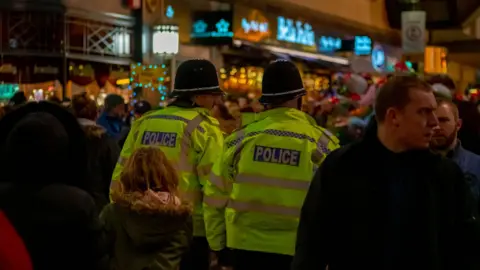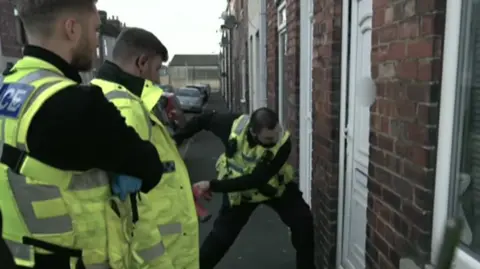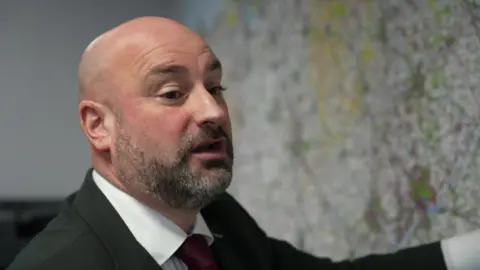 Getty Images
Getty ImagesPolice chiefs have warned the home secretary that without further funding neighbourhood police officers – a government priority – could be cut.
Nearly a quarter of police forces in England and Wales have called on Yvette Cooper to underwrite the costs of pay rises and higher employer taxes when details of their funding are announced early next week.
Some are facing budget deficits of £10m or more, and the chief constable of Lincolnshire Police has told the BBC the jobs of a third of his officers could be at risk, jeopardising the force’s viability.
A Home Office spokesperson said the police funding settlement for next year would “cover the annual pay award in full and give forces more money to recruit officers and keep our streets safe”.
The home secretary had confirmed that forces would be “fully compensated” for the changes to employer National Insurance contributions, the spokesperson added.
In a recent speech, Yvette Cooper announced police spending in England and Wales would increase by more than £500m, which included £100m to pay for 13,000 more neighbourhood officers and £260m for additional tax and pay costs.
But since then, some police chiefs have warned they still face deep cuts and have questioned whether the additional funding will continue beyond this year.
Sir Mark Rowley, the commissioner of the Metropolitan Police, Britain’s biggest force, has warned that 2,300 officers and 400 other staff may have to go.
Chief constables have been given extra money in recent years to fund what the Conservatives called an “uplift” in police numbers. This largely restored the number of staff to previous levels, following cuts made during the austerity of the 2010-2015 coalition government.
However, some forces say they are now struggling to maintain government-prescribed minimum officer levels. If they drop below the minimum, they lose some funding.
Police areas around the country have dug deep into reserves and many have sold off property to protect frontline staff.

The BBC has been told that police forces who have either written or contacted the home secretary to ask for help include:
- Lincolnshire Police, the worst-funded force in the country per head, which risks having to shed 400 of its 1,100 officers, according to its chief constable
- Essex Police, with a £10m potential deficit, and warning of cutting 200 officers, losing valuable experience in neighbourhoods
- Essex, Cambridgeshire, Suffolk and Hertfordshire have sent a joint letter to the Home Office warning of cuts
- Norfolk and Bedfordshire, who have made separate representations.
The Metropolitan Police, the largest police force in the country, which also covers national responsibilities such as counter-terrorism, faces a potential deficit of £450m.
The government is expected to announce funding for each force next week, but senior officers are questioning whether the money available will be based on the actual deficits they face or the funding formula which determines more broadly how much each force receives.
Home Office officials insist the actual bill for higher taxes and pay will be met for the next year.
The government has not yet committed itself to reforming the funding formula.
This was devised in 2006 and some forces say it is now out of date. Changing crime patterns and growing populations have resulted in them struggling to maintain funding levels.
Lincolnshire has seen its population increase by 13% in the last 20 years, and said funding had not kept up.
Chief Constable Paul Gibson said that to maintain current operations, the force would need an extra £57m over the next three and a half years.
If the government did not help, he said, “I would need to be taking maybe more than 400 police officers and police staff out of the organisation.”

Lincolnshire currently employs 1,189 officers.
“At what point does a police force lose its viability?” he asked. “We’ve got very good people who do good things with the resources they have at their disposal and I’m hugely supportive of that.
“But the bottom line is we can’t police on a shoestring.”
The county’s Conservative police and crime commissioner, Marc Jones, said officers had to travel long distances between towns to transport suspects because of a lack of custody suites and, with one of the biggest rural road networks, police units struggle to prevent high levels of traffic deaths and injuries.
Lincolnshire has around 60 neighbourhood officers covering 2,500 square miles. Grimsby, policed by neighbouring Humberside, has the same number of officers for a single town.
“It’s outrageous that our next-door neighbour can put as many neighbourhood police officers in one town as we can deploy across our whole county,” Mr Jones said, adding “that is not sustainable”.
Chief Constable Gibson said the funding issue was so stark, all of the county’s 60 neighbourhood officers could be at risk, which he argued would turn Lincolnshire into a purely “reactive” force.
He rejected the suggestion the force could find more savings. In recent years Lincolnshire has replaced police helicopters with drones, moved gun licensing online, and introduced mobile fingerprint units in an attempt to save money.
Rethinking the 2006 police funding formula could bring Lincolnshire an extra 10% to 12% more cash.
But better funded forces would lose money, creating a difficult political challenge for the government, so a new formula remains on the shelf.
A further funding announcement for future years is expected in April, and officials have indicated they might consider updating the funding formula.
The government is working on plans to improve the way police forces buy equipment and services, and to help forces share resources.
Officials say this will help forces balance budgets and improve services.

